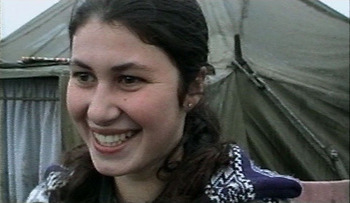more Sean McAllister

http://www.bbc.co.uk/bbcfour/documentaries/storyville/sean-mcallister.shtml
BBC Four: What was it about Samir that you felt was worth your attention?
SM: It takes a long time to make my films and I don't really want to do them with people I don't want to be with. So first and foremost I enjoyed his company. Secondly, he spoke very good English, which was important, especially as I don't speak Arabic. But ultimately there was a story. It seemed an interesting premise that at the point of Iraqi liberation here was a man who was anti-Saddam and said quite up front, "My country is finished now. I'm leaving". As soon as I met his daughter Sahar and realised that she was pro-Saddam then I knew that this was a great area of conflict which brought in the whole political sphere, but through the family rather than in any contrived way
...BBC Four: A lot of documentaries have come out of Iraq. How do see yourself as a documentary filmmaker within the context of all the media covering Iraq?
SM: I don't know. In a way it would be interesting for others to judge. You always think that you're not really making a film when you're hanging out with someone for so long. A lot of what I shot with Samir is the same mundane sort of stuff I would do making a film in Britain with somebody. But that's what I think is important because it ends up being a human story within a political context rather than a political film. In a funny kind of way it didn't do well at certain festivals because it wasn't hammering America like Fahrenheit 9/11. But Sundance has taken it - they enjoy that more subtle kind of approach.
BBC Four: What is Samir's current situation?
SM: He's in Amman with his son and daughter. I was on the phone to him yesterday. He was having difficulty getting a visa to come to the premiere at Sundance. But he was also crying because his neighbour, who I knew, had been killed. He was driving through an area where the resistance had tried to attack the Americans. The Americans just spray around everybody. He got a bullet in his head and a bullet in his petrol tank. Thirty years old with three kids. He burnt away in his car.





